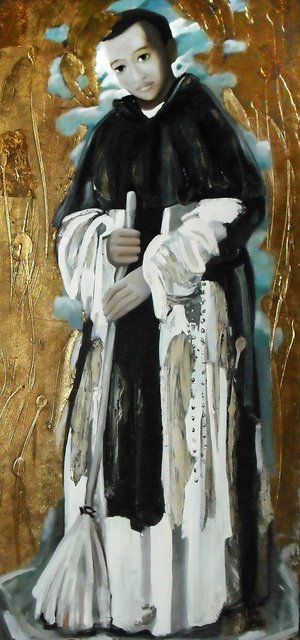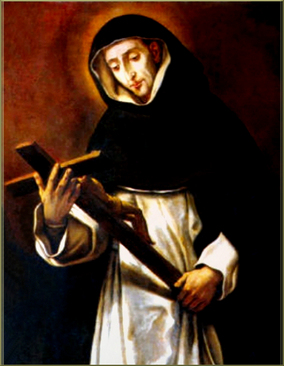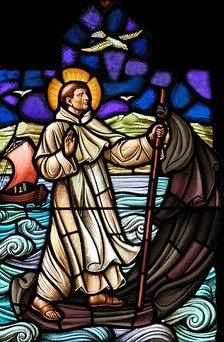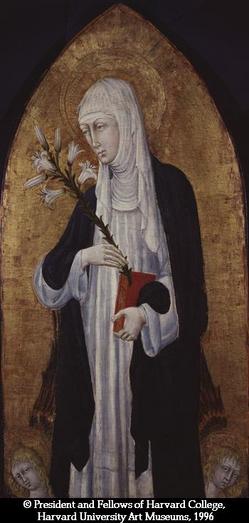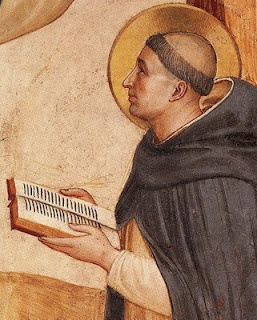 O God, who made Saint Thomas Aquinas outstanding in his zeal for holiness and his study of sacred doctrine, grant us, we pray, that we may understand what he taught one imitate what he accomplished.
O God, who made Saint Thomas Aquinas outstanding in his zeal for holiness and his study of sacred doctrine, grant us, we pray, that we may understand what he taught one imitate what he accomplished.
Tag: Dominican saints and blesseds
Saint Albert the Great
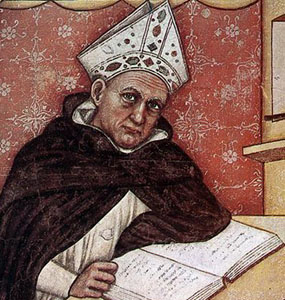 St Albert the Great reminds us that there is
St Albert the Great reminds us that there is
friendship between science and faith and that through their vocation to the
study of nature, scientists can take an authentic and fascinating path of
holiness.
which he carried out successfully, that is, the acceptance and appreciation of
Aristotle’s thought. In St Albert’s time, in fact, knowledge was spreading of
numerous works by this great Greek philosopher, who lived a quarter of a
century before Christ, especially in the sphere of ethics and metaphysics. They
showed the power of reason, explained lucidly and clearly the meaning and
structure of reality, its intelligibility and the value and purpose of human
actions. St Albert the Great opened the door to the complete acceptance in
medieval philosophy and theology of Aristotle’s philosophy, which was
subsequently given a definitive form by St Thomas. This reception of a pagan
pre-Christian philosophy, let us say, was an authentic cultural revolution in
that epoch. Yet many Christian thinkers feared Aristotle’s philosophy, a
non-Christian philosophy, especially because, presented by his Arab
commentators, it had been interpreted in such a way, at least in certain
points, as to appear completely irreconcilable with the Christian faith. Hence
a dilemma arose: are faith and reason in conflict with each other or not?
is one of the great merits of St Albert: with scientific rigour he studied
Aristotle’s works, convinced that all that is truly rational is compatible with
the faith revealed in the Sacred Scriptures. In other words, St Albert the
Great thus contributed to the formation of an autonomous philosophy, distinct
from theology and united with it only by the unity of the truth. So it was that
in the 13th century a clear distinction came into being between these two
branches of knowledge, philosophy and theology, which, in conversing with each
other, cooperate harmoniously in the discovery of the authentic vocation of
man, thirsting for truth and happiness: and it is above all theology, that St
Albert defined as “emotional knowledge”, which points out to human
beings their vocation to eternal joy, a joy that flows from full adherence to
the truth.
Saint Martin de Porres
Saint Louis Bertrand
O God, through mortification of the body and preaching of the faith, you raised the blessed Louis, your confessor, to the glory of the saints; grant that what we profess by faith we may ever fulfill by works of piety.
The preaching one hears from a member of the Order of Preachers ought to lead each person to a deeper relationship with God. Saint Louis Bertrand said, “If because of your preaching men lay aside enmities, forgive injuries, avoid occasions of sin and scandals, and reform their conduct, you may say that the seed has fallen on good ground. But to God alone give all the glory and acknowledge yourselves ever unprofitable servants.”
~Saint Louis Bertrand to the young Dominican students
Let us pray through Saint Louis Bertrand’s intercession for the Church in the Americas and the Islands.
Saint Dominic de Guzman
Blessed Constantius of Fabriano
God of justice and truth, you made Blessed Constantius renowned for his unceasing prayer and his zeal for peace.
By the help of his prayers may we walk in the path of justice
and reach everlasting peace and glory.
Blessed Christopher of Milan
God of all truth, you made Blessed Christopher a
faithful herald of your word to the people. By his life and ministry may we
keep Christ ever in our thoughts and in the love of our hearts.
Saint Raymond of Peñafort
Saint Catherine of Siena: ambassador, woman of holiness & spiritual mother
Pope Benedict spoke in his General Audience today of the great 14th century Dominican sister, Saint Catherine of Siena, holy woman, ambassador, truth-speaker, Doctor of the Church and spiritual mother. His choice of saint could not have been better since the presence of many of the new cardinals were in attendance. Rome Reports provides a brief video clip on the papal address.
Today I would
like to speak to you about a woman who has had an eminent role in the history
of the Church. She is St. Catherine of Siena. The century in which she lived —
the 14th — was a troubled time for the life of the Church and for the
whole social fabric in Italy and Europe.
However, even in
the moments of greatest difficulty, the Lord does not cease to bless his
People, raising men and women saints who stir minds and hearts, bringing about
conversion and renewal. Catherine is one of these and still today she speaks to
us and pushes us to walk courageously toward sanctity to be disciples of
the Lord in an ever fuller sense.
Born in Siena in 1347 to a very numerous
family, she died in her native city in 1380. At 16, moved by a vision of St.
Dominic, she entered the Dominican Third Order, in the feminine branch called
the Mantellate. She stayed with her family and confirmed the vow of virginity
she made privately when she was still an adolescent; she dedicated herself to
prayer, penance, and works of charity, above all for the benefit of the sick.
When
her fame for sanctity spread, she became the protagonist in an intense activity
of spiritual counsel, dealing with all categories of persons: nobles and
politicians, artists and ordinary people, consecrated persons, ecclesiastics,
and including Pope Gregory XI, who at that time resided in Avignon and whom
Catherine exhorted energetically and effectively to return to Rome. She
traveled a lot to solicit the interior reform of the Church and to foster peace
between states. For this reason also the Venerable John Paul II declared her
co-patroness of Europe: so that the Old World would never forget its Christian
roots that are at the base of its journey and continue to draw from the Gospel
the fundamental values that ensure justice and concord.
Continue reading Saint Catherine of Siena: ambassador, woman of holiness & spiritual mother
Saint Albert the Great
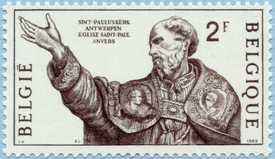 The learned will shine like the brilliance of the firmament, and those who train many in the ways of justice will sparkle like the stars for all eternity. (ent. ant.)
The learned will shine like the brilliance of the firmament, and those who train many in the ways of justice will sparkle like the stars for all eternity. (ent. ant.)
